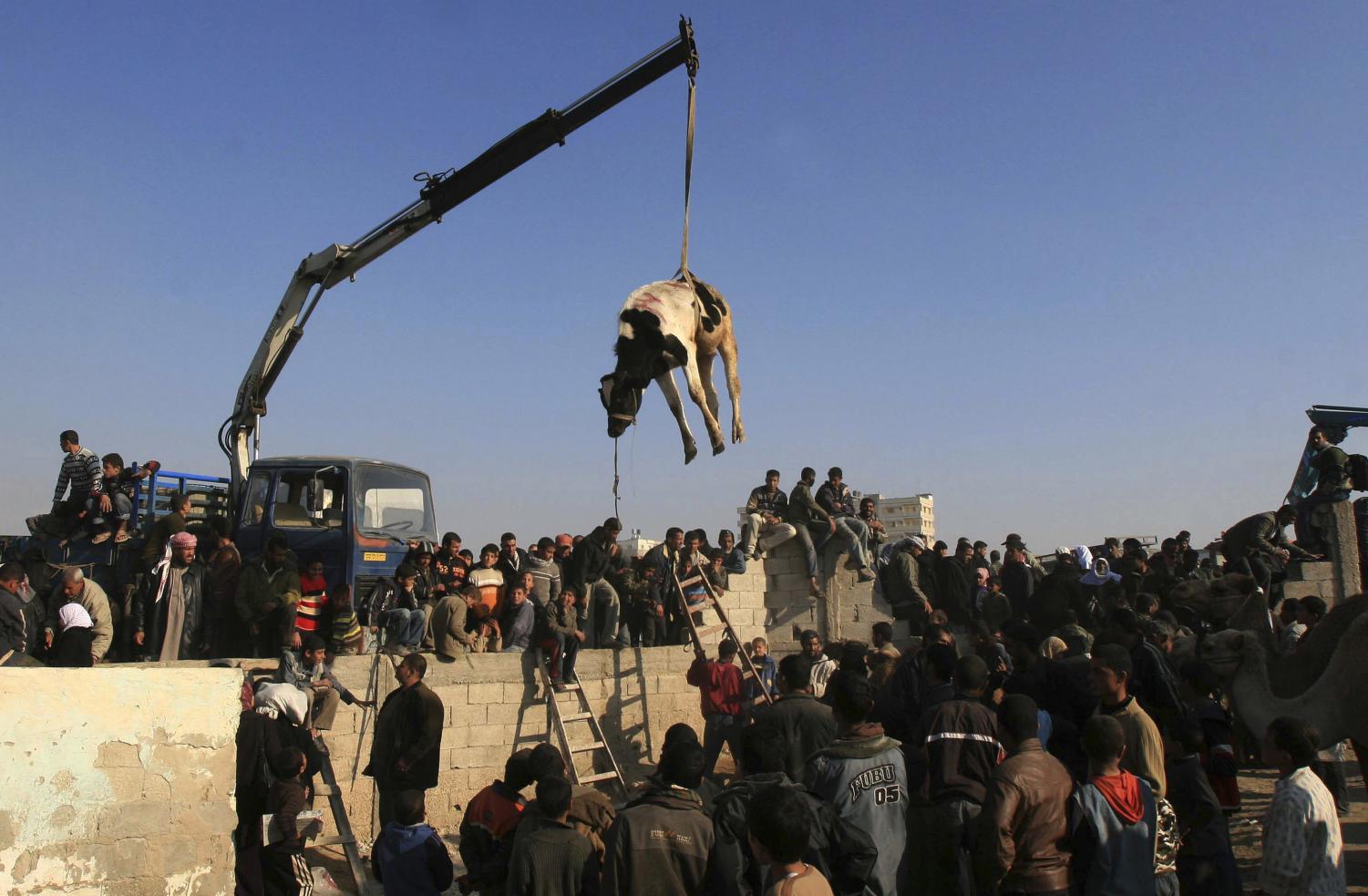RAFAH, Egypt — Thousands of Palestinians pushed their way into Egypt past human chains of guards with riot shields after a bulldozer wrecked another section of fence along the Egypt-Gaza border.
Men in black clothing stood atop the bulldozer as it knocked down a concrete slab under the watchful eyes of Egyptian forces on the other side who shot in the air in an attempt to hinder the flow of Gazans into Egypt.
Palestinians, many of them carrying empty fuel canisters, managed to push through several openings despite the presence of the Egyptians deployed nine rows deep in some places. At one point, guards aimed a water cannon above the heads of people, not at them, to keep them back.
Cranes were positioned next to the border, lifting crates of supplies and even livestock over into Gaza.
The border was first breached Wednesday, when Palestinian militants blew down large sections of the border wall. Since then, Egypt has allowed tens of thousands of Palestinians to go back and forth, but has rejected any suggestion of assuming responsibility for the crowded, impoverished territory.
Earlier Friday, Egyptian forces took up positions a few steps into Palestinian territory, using shields to protect themselves from some Gazans who climbed atop car roofs and threw stones at them. Witnesses said a photographer was lightly injured in the clash.
The visitors included a gaggle of Palestinian women in finely embroidered dresses and fresh makeup, heading to relatives’ weddings in Egypt they said had been hastily moved up to allow Gazan family members to attend.
Yousef Mohammed, 17, from Gaza, said he waited until Friday to make the trip because he was trying to get together enough money first to shop in Egypt. ”They don’t want us to go in,” he said, pointing at the riot police.
Travelers returning from Egypt said they heard loudspeaker announcements there that Gazans had to return home by 7 p.m. Friday.
By mid-afternoon Friday, Egyptians eased up on the attempts to restrict the cross-border movement. Hundreds of riot police suddenly left a border crossing at Rafah, to march back into the Egyptian side of the divided town, and Gazans again streamed by the hundreds through the regular crossing.
An Egyptian soldier was reported slightly wounded to the leg earlier in the day, likely from gunshots fired by Hamas militiamen sporadically from the Gazan side, said an Egyptian officer, speaking on condition of anonymity because he was not allowed to talk to the media. Five policemen also were injured by stones hurled by Gazans protesting the attempts to restrict their movement into Egypt.
The border issue became a verbal spat between Egypt and Israel when Israeli Deputy Defense Minister Matan Vilnai said Israel gradually wants to relinquish responsibility for Gaza, now that its border with Egypt was blown open.
It was a position echoed by other Israeli officials, who said the border breach could pave the way for increasingly disconnecting from the territory.
Israeli Defense Minister Ehud Barak, speaking on Thursday to The Associated Press on the sidelines of the World Economic Forum in Switzerland, said he did not want to ”go too far in my interpretation of this.”
Egypt angrily rejected the Israeli ideas and said it would not change border arrangements.
In an interview published Friday in the weekly Al-Osboa, President Hosni Mubarak called the situation in Gaza ”unacceptable” and called on Israel to ”lift its siege” and ”solve the problem.”
State Department spokesman Tom Casey told reporters Friday that ”Egypt understands that it needs to act to control its border. It’s a sovereign state, and it needs to have control over its sovereign border.”
The opening of the border, even if temporary, provided a significant popularity boost to Gaza’s Hamas rulers, who can claim they successfully broke through the internationally supported Israeli closure that has deprived the coastal strip of normal trade and commerce for nearly two years.
Both Egypt and Israel restricted the movement of people and goods in and out of Gaza after Hamas won parliament elections in 2006, and further tightened the closure after Hamas seized control of the area by force last June.
Sami Abu Zuhri, a Hamas spokesman, said Palestinians had to keep breaches open in the barrier ”until the crossings are reopened.” ”The gaps shouldn’t be closed because they provide urgent assistance to the Palestinians,” he said.
A handful of black-clad Hamas gunmen fanned out along the Gaza side of the border Friday, attempting to create order amid waves of Gaza residents approaching the area. It was the first time since the border fence was torn down that Hamas deployed uniformed men to deal with the chaos. The militant group has been using plainclothes agents to regulate the crowd.
Warning that militants were among the Palestinians who entered Egypt, the Israeli military raised its level of alert Thursday, fearing an attack on Israel, and closed the highway along the Israel-Egypt border.
Overnight, Israeli air strikes killed four Hamas militants around Rafah, Palestinian and Israeli officials said Friday.
Two Hamas militiamen were killed as they drove near the shattered border fence with Egypt and two more died while driving in Rafah town, Palestinian security officials said.
Israeli police on Friday limited Palestinians’ access to Jerusalem’s al-Aqsa mosque complex — Islam’s third-holiest shrine — fearing violent protest there against Israel’s blockade of the Gaza Strip.







